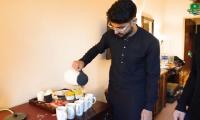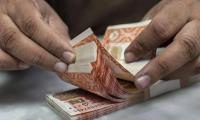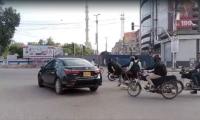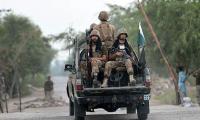Cases of severe nasal bleeding among schoolchildren on the rise
Islamabad
The mercury level is recording a sharp increase consistently in this region of the country for the last five days putting general public at risk of facing heat related disorders but the school children are at the greatest risk of suffering heat stroke, heat syncope, heat exhaustion, heat cramps and nasal bleeding.
The most common heat related disorder among school going children is nasal bleeding and significant cases of nasal bleeding are being reported in majority of educational institutions in the district.
Many health experts are of the view that the mercury level touching 43 degree Celsius or above should be considered as an emergency as it may cause irreversible losses. The chance of falling prey to heat stroke is much higher among school children.
Almost all healthcare facilities in the twin cities of Islamabad and Rawalpindi have started receiving cases of heat exhaustion, heat syncope and heat cramps. The severe heat spell prevailing in the country has already claimed at least three lives on Friday.
According to a number of health experts, the exposure to sun while going to or coming from schools at daytime under the blazing sun may put children in life-threatening condition but still none of the concerned government authorities have so far taken notice of the issue.
A number of parents worried about the health of their children expressed to ‘The News’ that the administrations of the schools should examine the situation and give holidays to at least young children, below 12 years of age.
The school administrations in both public and private sectors should change their timings at least during the recent severe heat spell for the sake of children who have to suffer severe heat at noon, said a top official serving at RMC and allied hospitals while talking to ‘The News’ on Friday.
Pleading anonymity, he said the government authorities should direct schools’ administrations to reduce the timings of the schools during the recent heat spell and children should be allowed to go home before 11:00 a.m. instead of after 1:00 p.m., the hottest time of the day. Similarly, the children studying in the second shift should e asked to come to school at round 11:00 a.m., he said.
Of course, the school going children have been suffering the worst effects of the recent severe heat spell and their health is certainly at stake, said Deputy Director at Pakistan Institute of Medical Sciences Dr. Waseem Ahmed Khawaja while talking to ‘The News’ on Friday.
He said the school going children are at greater risk of facing losses because of another factor that is most of the private and public sector schools do not have proper first aid rooms or treatment facilities.
The Eid milan party was organised by the students of Aiwan-e-Quran of AIMS Education System, here. The students and...
Jacaranda Family Club, DHA-2 Islamabad. — x/islaamabadIslamabad: Innovista Rawal, a dynamic co-working space,...
The 22nd convocation of Islamabad Model College for Girls Postgraduate, G10/4 was held at the college auditorium on...
Dean of Indus University, Dr Aftab Madni. — Indus University websiteIslamabad: Dean of Indus University, Dr Aftab...
Poets from Pakistan, Canada and the US reading out their poems in Mushaira held at the launch of the PST Canada...
Relatives sit next to patients suffering from dengue fever resting under a mosquito net at a hospital in Pakistan. —...







